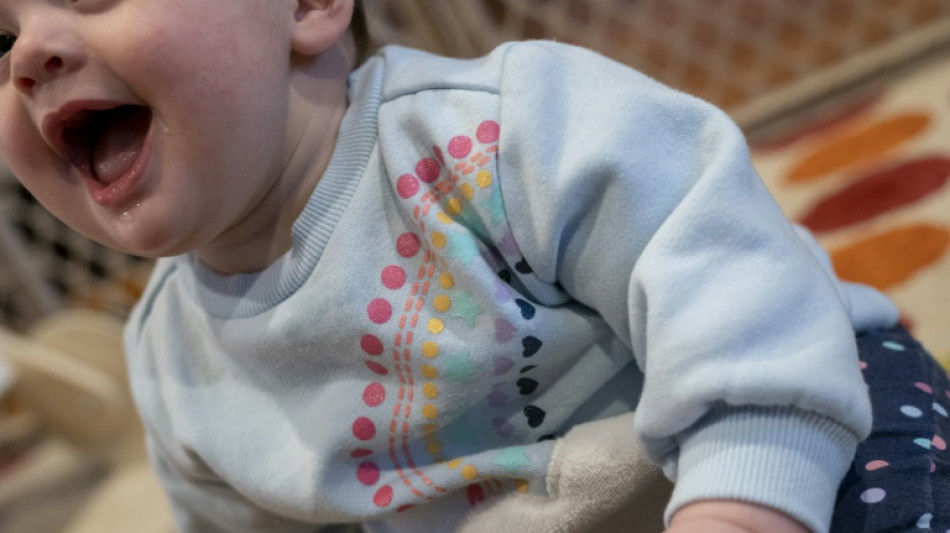
-
 Migrant's expulsion puts Washington Salvadorans on edge
Migrant's expulsion puts Washington Salvadorans on edge
-
Plan for expanded Muslim community triggers hope, fear in Texas

-
 Pakistan foreign minister due in Kabul as deportations rise
Pakistan foreign minister due in Kabul as deportations rise
-
White House touts Covid-19 'lab leak' theory on revamped site

-
 Dodgers star Ohtani skips trip to Texas to await birth of first child
Dodgers star Ohtani skips trip to Texas to await birth of first child
-
US senator says El Salvador staged 'margarita' photo op

-
 Ford 'adjusts' some exports to China due to tariffs
Ford 'adjusts' some exports to China due to tariffs
-
Thomas maintains two-shot lead at RBC Heritage

-
 US to withdraw some 1,000 troops from Syria
US to withdraw some 1,000 troops from Syria
-
Four killed after spring storms wreak havoc in the Alps

-
 Spurs' Popovich reportedly home and well after 'medical incident'
Spurs' Popovich reportedly home and well after 'medical incident'
-
Trump goes to war with the Fed

-
 Celtics chase second straight NBA title in playoff field led by Thunder, Cavs
Celtics chase second straight NBA title in playoff field led by Thunder, Cavs
-
White House site blames China for Covid-19 'lab leak'

-
 Norris edges Piastri as McLaren top Jeddah practice
Norris edges Piastri as McLaren top Jeddah practice
-
Trump warns US could ditch Ukraine talks if no progress

-
 Judge denies Sean 'Diddy' Combs push to delay trial
Judge denies Sean 'Diddy' Combs push to delay trial
-
80 killed in deadliest US attack on Yemen, Huthis say

-
 Lebanon says two killed in Israeli strikes in south
Lebanon says two killed in Israeli strikes in south
-
Trump says US will soon 'take a pass' if no Ukraine deal

-
 F1 success is 'like cooking' - Ferrari head chef Vasseur
F1 success is 'like cooking' - Ferrari head chef Vasseur
-
Cycling mulls slowing bikes to make road racing safer

-
 Macron invites foreign researchers to 'choose France'
Macron invites foreign researchers to 'choose France'
-
Klopp 'happy' in new job despite Real Madrid rumours: agent

-
 Alcaraz into Barcelona semis as defending champion Ruud exits
Alcaraz into Barcelona semis as defending champion Ruud exits
-
Vance meets Italy's Meloni before Easter at the Vatican

-
 Evenepoel returns with victory in Brabantse Pijl
Evenepoel returns with victory in Brabantse Pijl
-
Maresca confident he will survive Chelsea slump

-
 Mob beats to death man from persecuted Pakistan minority
Mob beats to death man from persecuted Pakistan minority
-
Lebanon says one killed in Israeli strike near Sidon

-
 Arsenal's Havertz could return for Champions League final
Arsenal's Havertz could return for Champions League final
-
US officials split on Ukraine truce prospects

-
 Client brain-dead after Paris cryotherapy session goes wrong
Client brain-dead after Paris cryotherapy session goes wrong
-
Flick demands answers from La Liga for 'joke' schedule

-
 'Maddest game' sums up Man Utd career for Maguire
'Maddest game' sums up Man Utd career for Maguire
-
Trial opens for students, journalists over Istanbul protests

-
 Gaza rescuers say Israeli strikes kill 24 after Hamas rejects truce proposal
Gaza rescuers say Israeli strikes kill 24 after Hamas rejects truce proposal
-
'Really stuck': Ukraine's EU accession drive stumbles

-
 'Not the time to discuss future', says Alonso amid Real Madrid links
'Not the time to discuss future', says Alonso amid Real Madrid links
-
74 killed in deadliest US attack on Yemen, Huthis say

-
 Southgate's ex-assistant Holland fired by Japan's Yokohama
Southgate's ex-assistant Holland fired by Japan's Yokohama
-
Vance meets Meloni in Rome before Easter at the Vatican

-
 Ryan Gosling to star in new 'Star Wars' film
Ryan Gosling to star in new 'Star Wars' film
-
Hamas calls for pressure to end Israel's aid block on Gaza

-
 Russia says Ukraine energy truce over, US mulls peace talks exit
Russia says Ukraine energy truce over, US mulls peace talks exit
-
58 killed in deadliest US strike on Yemen, Huthis say

-
 Museums rethink how the Holocaust should be shown
Museums rethink how the Holocaust should be shown
-
Three dead after deadly spring storm wreaks havoc in the Alps

-
 No need for big changes at Liverpool, says Slot
No need for big changes at Liverpool, says Slot
-
Bloody Philippine passion play sees final performance of veteran 'Jesus'


The dribble test: How toddlers spot close social ties
The thought of sharing an ice cream cone with a stranger can trigger feelings of disgust -- however that's often not the case with someone close to us, such as a romantic partner or child.
A new study in the journal Science on Thursday shows that children are aware of this dynamic from a very young age, and see saliva exchange -- through activities like kissing, sharing food, or wiping away dribble -- as a cue to tell whether two people have a special bond.
"We know from a lot of research that infants are super attuned to that social aspect of their world," Ashley Thomas, a researcher at Harvard and MIT, told AFP.
"But one thing that we didn't know before this study is whether they really pay attention to different types of relationships."
In particular, Thomas and colleagues wanted to know whether children can distinguish special relationships referred to as "thick," a term first coined by the philosopher Avishai Margalit.
To test whether children make the same distinctions as adults, the team devised a series of experiments.
First they presented a group of more than 100 children aged five to seven with cartoons featuring characters in interactions with each other.
The children successfully predicted that "sharing utensils, or licking the same food item, would occur within nuclear families, whereas sharing toys and partitionable food would occur equally within friendships and families."
- Puppet show -
Next, the researchers wanted to test the theory on infants and toddlers, who cannot vocalize their thoughts as well as older children.
Their experiment was inspired by classic studies of vervet monkeys, who heard a familiar juvenile in distress and looked toward that juvenile's mother, expecting her to respond.
To recreate the idea for young humans, they made video clips featuring two female research assistants from Thomas's lab play-acting with a cute blue puppet.
The first woman took a bite of an orange slice, then fed the puppet, then took another bite of the same slice.
The second woman is then shown passing a ball back and forth with the puppet.
"Both are really friendly interactions and cooperative, but only one of them might be something that we would associate as adults with a close relationship," said Thomas.
They then showed their dozens of subjects a clip of the same puppet crying, with both women on either side of it, and measured who the babies looked at first and for how long.
The children surmised that the pair in a saliva-sharing relationship were closer.
Both actresses -- who were of different ethnicities -- played in both roles to different groups of economically and racially diverse toddlers.
To make sure the children weren't just assuming a person who shares food is inherently nicer, they ran another test in which the subjects were shown the same opening videos, but the puppet in distress was a new character.
When this happened, neither the infants nor toddlers looked first or longer at the food sharer.
Finally, they ran a test where one actress placed her finger in her mouth, rotated it, then placed it in the puppet's mouth, while the other actress performed the same rotating actions on her and the puppet's forehead.
Once more, the children looked more to the actress sharing saliva when the puppet cried, isolating this as the marker.
- Making connections -
The findings build on scientific understanding about how children grasp social dynamics, said Thomas.
"We know, for example, that infants pay attention to who's nice to someone else," she said.
"The main takeaway of this study is that infants are not only paying attention to people's traits... they're also paying attention to who's connected and how they're connected."
Understanding how we think about human relationships might one day have practical benefits, for example by helping people who find it harder to forge such bonds.
"What a moral failing it's been that we haven't helped autistic people with their connections with other people," said Thomas.
"They really want those connections, and they just might lack some of the skills to create them. I think that this research could help us help other people navigate relationships eventually."
A.Gasser--BTB



